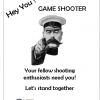Search the Community
Showing results for tags 'little homework on gun'.
-
browsing the net for the gun i own ,found nothing then came across some info:- William Calder 1891 – 1893 89 Gallowgate 1893 – 1894 15 Guild Street 1894 – 1897 36 Guild Street 1997 – 1906 30 Guild Street 1906 – 1923 24 Guild Street Between 1912 and 1919 there was also an outlet at 99 George Street, William Calder was, I think father of Ernest Calder. In 1923 the shop was occupied by James Watson. The following comes from Fraser Henderson in New Zealand, William's great grandson and Ernest's Grandson, it charts the story of the Calders business: William Calder rose from absolute poverty in Rosemount to become a relatively wealthy man. He was a very powerful personality but a hard worker. Ernest Calder, born in King St Place, stood on his father's shoulders, and he too achieved modest wealth from hard work and honesty. No matter how down at heel the customer, if I met him somewhere in town, or at the Donmouth, when I was fishing for flookies on Gordon College's sports day (!) my grandfather expected me to say "Hello!" To overcharge a customer or put one across him, was unthinkable. William Calder 1849-1918: William came from generations of keen shooters and fishermen. His great grandfather had been an armed guard for smugglers at Balgownie, when they were unloading rum and gin at the Cot Town from a Dutchman, anchored at night off the Donmouth. Bill Calder founded a very successful sportshop in Guild St. A keen rough shooter and wildfowler, as well as a fitness fanatic, and Springer Spaniel breeder, he was well known for scrupulous honesty, aetheism and a belief in communism. He directly imported shotguns from Belgium, and was fussy about where his trout, salmon, and mackerel flies came from. (Playfair? His nephew's sister-in-law was forewoman there.) William had his son serve an apprenticeship first as a locksmith, then brought him into the shop to further serve under a gunsmith employed at the Calder premises. This old man taught Ernest to make gun actions as well as repair them. hence why Ernest Calder called himself a "gunmaker." When Buffalo Bill came to Aberdeen in Aug 1904, William Calder and his son Ernest, loaded all the cartridges for the show. Buffalo Bill just strolled into the Guild St shop and did business with a handshake. The circus took place in Central Park. A later group of Texan trickshooters also came to the shop on the recommendation of William Cody, and their cartridges were also all hand loaded by William & Ernest, and revolvers and rifles were shot in with the new ammo in the cellar below Guild St. The exhibition of shooting took place on the Town Links and gunsmithing was done for them by Ernest Calder. A San Antonio gunsmith came over to Aberdeen on the recommendation of the Texans, to offer Ernest Calder a partnership. The Texans had been impressed at his gunsmithing. But Ernest stayed loyal to his father. William Calder in 1910 Ernest Calder 1875-1956: After some silly quarrel, Ernest went into opposition as a sports dealer against his father in 1913 at 67/69 King St. He was a champion cyclist at the Torry Racing Track, and added cycles to the business range. He was also a keen sea angler, golfer, foil swordsman, gymnast, and a superb rifle, shotgun and revolver shot. He also was a taxidermist and sold ferrets! He suffered a damaged heart from a bout of rheumatic fever, and could not serve officially in WW1. But he was made an acting sergeant by the Gordon Highlanders, and taught marksmanship with the .303 rifle as well as revolver shooting to officers. His teams did well in national competitions. One of his novelties was to tie a No 6 hook to a silk line and sell it as a penny hook for catching flounder. Many a slum kid started a lifetime's fishing passion with a Calder penny hook. All good for business! He sought the best quality he could find at reasonable prices, as most of his customers were working class people. But estate managers and gamekeepers also became customers because of the quality at a good price. He had a forge in his shop, and as well as gunsmithing, he browned and blued barrels. He carried an extensive range of cheaper firearms from Birmingham, as well as a variety of second hand shotguns & rifles, and a wide variety of fishing rods, reels, flies, spoons, spinners, etc. One spoon was an invention of his son-in-law, and never patented, but very popular for sea trout. His target market was the working class people of Aberdeen and the countryside. In attending to that customer base, he won trade from estates, gamekeepers, and all sportsmen keen on value. This approach served the business well throughout the Great Depression. He also repaired rods, and replaced guides, etc but preferred not to! It returned a poor profit! Many salmon poachers bought their gear from Calders! Calder's hooks did not snap, the alloy was malleable, an indispensable characteristic in the dark. No flies were tied on the premises, but were bought from reputable wholesalers. By the late 1930's his customers were nationwide, and queries regularly came from overseas. His Aberdeen Firearms Dealer Licence was Number 1. On his death, his daughter Gertrude Henderson continued the business in trust for his family as manager.

